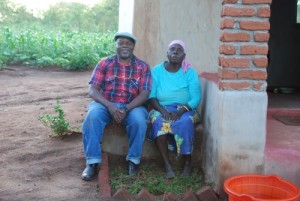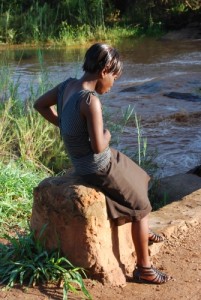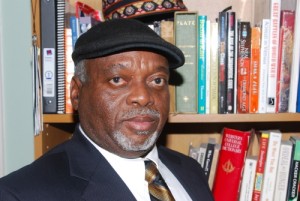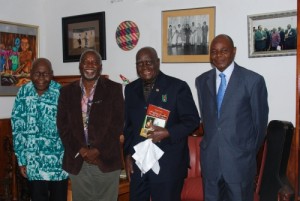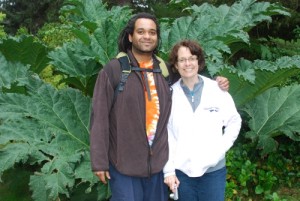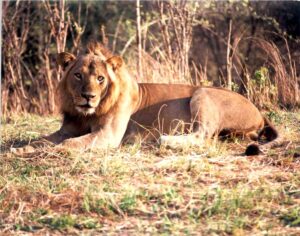Growing Up
My name was formerly Jacob Tembo. I was born at Mshawa Chungu primary school outside Chipata in 1954 where my father was teaching at the time. The best thing my parents did for me for the whole of my life for which I will forever be grateful is when they sent me home when I was
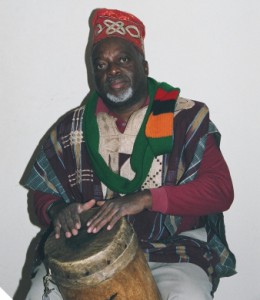
Prof. Tembo regards the African drum as representing some of the most fundamental deeper aspects of Zambian and African traditional culture. He has done storytelling of Zambian folk tales and drumming to audiences in the United States.
a young boy to live at Chipewa Village at my mother’s village in Lundazi among the Tumbuka people. I lived with my grandparents Mateyo Kabinda and Esilete Nya Mwaza. Living in the village was like being in heaven on earth. My father’s village, Seleta, was about one kilometer away. Between the two villages I lived among six hundred loving relatives. I lived among my grandparents, uncles, aunts, numerous cousins, and many people from other clans. All of the people loved me.
We ate nshima with nchunga ziswesi or red kidney beans, peanuts, pumpkin leaves, or mphangwe vegetables with peanut powder, delele, peas, pumpkins, chicken, goat meat, and wild meat when adult men when on hunts in the dry season. There was plenty of food as my grandparents were great subsistence farmers. As children we went to the bush and fetched fruits such as futu, nthumbuzgha, masuku, kasokolowe, mbulimbunje, and nchenja. We dug mice and killed small birds. We swum and fished in the cool swift fresh waters of the Lundazi River and Denkhule creek. During the bright savannah moonlight at night we would listen to vilapi or folktales or play hide and seek. My cousin James Kabinda and I were charged with herding the family goats. Every day was so full of drama and adventure until one day my uncle called me to take me to school for the first time.
Going to School
My uncle took me to school one afternoon to start Sub A or Grade I at Boyole Primary School in 1960. When my uncle let my little hand go to walk into the classroom, our teacher Mr. Mbuzi welcomed me and told me to squeeze between some of the students on the few desks. The class had about 40 students. The teacher was drawing a big snake on the black board as I joined the class in singing:
Chinjoka chikulu chikamnyenga Adam
Adam na Eva
A big snake tempted Adam
Adam and Eve
This was a religious knowledge class. That’s started what was to be along academic career. That same year my mother came and got me so that I could join the family at my father’s first teaching assignment after his teacher training at Katete Mission. We lived at Chasela Primary School among the Bisa people for two years before my father was transferred. The thing I remember the most from Chasela are the friendly people but especially wild animals. Every day when I woke up I could see elephants, giraffes, monkeys, Impalas, large herds of buffaloes all roaming freely everywhere around my house. I cannot believe today that there are so few animals in the same Luangwa Valley where I lived 53 years ago.
My father taught at Mafuta School, Dzoole School, Kapongolo School, Kasonjola, Gundani and Mnoro school.
Challenges of School and Education
I was never always the most intelligent as I gained my education. But what my grandparents and parents taught me was to work hard at everything just as we did when we woke up every day early in the morning during the rainy season to work in the field with a hoe to grow food. My parents instilled in all of us 9 children; 6 girls and 3 boys the value of hard work, tenacity, and endurance. The best gift my parents gave us is by example to teach us to be kind, generous, and compassionate, to enjoy laughter, and to share what we have. But my parents also taught us to be tough, assertive, and to always defend ourselves. Being soft, to be paralyzed by fear or katelu was not allowed in our family among all the girls and boys. My mother had a saying that I always remember: “Mwana wolera nge ni botolo yayi”; meaning “You do not raise a child like a delicate bottle that is going to break any time you drop it.”
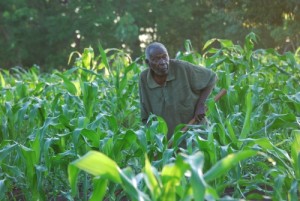
Dr. Tembo’s father Mr. Sani Tembo who is 89 years old is still active and works hard hoeing to grow food. This was in December 2011
When my father was teaching at Mafuta School, Dzoole School was burned down in 1962 in an arson attack as the African National Congress (ANC) led by Harry Nkumbula and the United National Independence Party (UNIP) and Zambians defied, struggled and protested British colonial rule. My father was assigned to go and reopen the school as he worked with the Parents Teachers Association (PTA) to rebuild the school. My father opened grade one as he taught the class under the shade of a huge Kachele tree. Since Dzoole Primary School did not have Standard II or Grade 4 yet, my father arranged that I attend a weekly boarding at Rukuzye Primary School which was 15 miles or 24 Kms. away and I was only 9 years old. Every week for 6 months in 1963, my mother packed me food for the week in a small carton box. I went to that school on Sunday riding my mother’s bicycle and came back every Friday.
In January 1964, I was accepted to attend Standard 3 or Grade 5 at Tamanda boys Upper Boarding School. This was a Dutch Reformed Mission Church Mission School on the remote border with Malawi. The first night I cried all night because I was away from home among some hostile students as mockery was very intense. But I remembered what my parents told me about the importance of education for my future and that of my family. My education at Tamanda was the best. I had some of the best teachers. The ones I remember are my English teacher and Headmaster Mr. Elisa Phiri, my brother-in-law who married my sister, Mr Lyson Mtonga, and Mr. Khondowe.
Something happened to me and my family that had a profound effect on my entire life. It was during the late afternoon of manual work at Tamanda Mission Boys Upper Boarding School. I was performing manual work sweeping the dusty school yard excitedly chatting with a detail of fellow students when a student walked to the group and told me the School Headmaster Mr. Phiri wanted to see me immediately in his office. My fellow students were surprised because I was not a typical trouble maker who broke school rules. I had been called to the Headmaster’s office once under some minor disciplinary circumstances where a received a stroke of the cane. But that was a year before. I was surprised too and wondered what I might have done wrong this time that I was not aware of. The Headmaster was well known for being a strict disciplinarian and for his stern red eyed chain smoking look. He freely used corporal punishment when necessary. I walked to his office with trepidation.
I softly knocked on his office door and a deep voice asked me to come in. I stood at attention as without any fanfare the Headmaster raised his head from his paperwork on his large desk and said: “Mwizenge, I just received a message from your father that your younger brother Leonard passed away last week. The message didn’t say what you brother died of. I am sorry.” The large clicking clock to the Headmaster’s desk showed 16.00 hours or 4:00pm June 14, 1966. I was 12 years old and my world had just fallen apart.
I was in shock and stunned. I don’t remember how I walked from the Headmaster’s office to my dormitory bed. I lay in my bed and I could not stop crying. When dinner time came, I could not walk to the dining hall. Another student brought my dinner and put it by the side of my bed. Students continued with their boarding school routine. They had to go to the classroom with the only paraffin lamp that had enough paraffin for studying and doing homework from 19:00 hours or 7:00 pm to 21:00 hours or 9:00pm.
The entire large dormitory with 60 beds was quiet and pitch dark. I cried as images of my little 7 year old brother flashed before me especially the last time I had seen him barely three weeks before as I was leaving for my boarding school early that morning. I played soccer with him as he tried to get the ball away from me. He was crying and running to get to the ball but each time I would kick it away as he yelled for help from mother. My mother yelled for me to give the ball to my crying little brother as I was leaving soon. My father was to escort me riding our bikes ten miles to the bus station at Lumezi. I gave the large soccer ball to my little brother who held it with both hands with a triumphant look on his face as I rubbed his head and walked away. My brother was now gone. I would never see him again.
My covers were drenched as tears poured from eyes. In the pitch dark dormitory room I heard footsteps and a voice. A student said the Headmaster wanted me to go to his house immediately. I walked the two hundred yards to the Headmaster’s house and knocked on his door.
The living room looked comfortable with nice cushions and sofas. He asked me to sit down in one of the sofas. My eyes were wet and red from non-stop crying. His young wife who had a baby on her back walked in from the kitchen with a teapot and some cups of tea. She served me some tea.
As the yellow kerosene lamp flickered, the Headmaster told me in a much softer voice I had never heard before how he was sorry about my brother’s death. He urged me to stay strong. He said I would be going to see my mother and father and family in six week times during the school holidays. Besides, soon I would be sitting for the most important exam in my life: the Secondary School Entrance Exams. He urged me to stay strong in life.
We sat quietly for may be twenty minutes and then he told me to go back to the dormitory.
Going to church twice per week and being a member of the church school choir were some of the best memorable experiences. I had so many friends and class mates including Michael Ngulube, Elliot Tembo, John Jere, Shuward Shawa, Leornard Phiri, John Mbewe, Yandikani Nkhoma, and the student who had very serious stuttering Malilo Ngwira.
Chizongwe Secondary School
The Tamanda Upper School Grade 7 class of 1966 had 40 students; only 14 of us qualified to go to secondary school. I was among about 6 students from Tamanda who reported for Form I at the prestigious Chizongwe Secondary School in January 1967 in Chipata. It was very challenging as all the Form One students were the best from the whole province. The next 5 years at Chizongwe were probably one of the most important. I made tremendous strides in learning in such subjects as Mathematics, Geography, English Literature, Physics, Chemistry, Nyanja, and Technical Drawing. I made lifelong friends and also met some of my best teachers who inspired me. Mr. Newton, a British teacher, told me I could do Physics and Chemistry when I did not have the confidence. Some of the teachers were Mr. Parkinson, Mr. Ad Hordyk, Mr. Bailey, My Geography Teacher Mr Milroy, and Miss Keon.
The most inspiring was probably our Principle Mr. J. S. Mei who was a disciplinarian who had the best of sense of humor. Every student from Chizongwe has a J. S. Mei story especially when we had a near student riot among Form Four and Form Five students in 1967. The Chipata Mobile police had to be called to campus for a day to quell tensions. Because Zambia lacked man power just after independence, the 22 teachers at Chizongwe were all European and Mr. Chirwa was the only Zambian teacher. I feel very lucky that Mr. Chirwa taught me and I learnt to write Nyanja because knowing that Zambian language is as significant or important as learning English. I found this out later in life in the 1980s as I began to conduct research as a scholar at the University of Zambia and now in 2013. Some friends form the 1971 class are Ben Kalinda, Kennedy Ngoma, Michael Ngulube, and Abdul Munshi.
The testosterone soaked teenage life of a Chizongwe Secondary School male student is consumed with thinking and dreaming about the beautiful girls of St. Monica’s Secondary School whose school was just over the mountain in Chipata. One classmate who will remain nameless even wrote a romantic poem about St. Monica’s girls which we published in the school newspaper. I can attest to this because I was on the editorial board for the school newspaper at the time in 1971.
University of Zambia Students Union (UNZASU) led students held a political demonstration and marched from the Great East road Campus to the French Embassy which was located on Freedom Way downtown Lusaka. The students were demonstrating against France selling Mirage Jet Fighters to the then Apartheid South Africa. Those jets were going to be used to support the regime as it bombed ANC bases in the front lines states. The young Zambian State and Police force may not have known yet how to handle public student demonstrations. The police tried to disperse the students using clubs and tear gas. There was commotion as the students fled and scattered some running through Cairo Road dodging through stunned busy Cairo Road shoppers with button totting police in hot pursuit. One fleeing student was shot in the behind apparently because a police officer accidentally discharged his fire arm. There was a huge controversy in the national press and government about the handling of the student demonstration. Fortunately no lives were lost and no one was seriously injured.
When the sensational news reached our school, we were all intrigued as we excitedly discussed the events in our dormitory in Aggrey House. We knew some of the names of the UNZASU students who had just gone to UNZA the previous year from Chizongwe. I never realized I would be at UNZA that following year and participating in student politics.
The 1971 From V class at Chizongwe had 65 students. I was among the top 6 of us who qualified to go to University of Zambia for our Bachelor’s degree in 1972. The competition was very stiff as the freshman class could only admit 350 of the best students from thousands of Form V or Grade 12 students from all secondary schools in Zambia.
University of Zambia
I will never forget my first day at University of Zambia. I was in African Hall 5 Room 26. I stood on the balcony and could see the beautiful green lawns and flowers around the residence hall. The 3 dining halls served 5 course meals including soup, rice, meat, vegetables, cake with custard, bread, tea or coffee with milk. Zambia had so much money that we used to get some of the left over bread and feed it to fish at the Goma Lakes during evening straws on campus.
I had always wanted to major in Psychology. In my own secondary school mind I mistakenly thought psychology would teach me how to read people’s minds. My most influential teachers were Professor Robert Serpell and Professor Muyunda Mwanalushi. The first year was intellectually exciting for my young mind. I learnt about the scientific method, psychology experiments, conducting sociological researching in neighboring Kalingalinga compound, Introduction to Political Science, Sociology, and Psychology. English class exposed to the powerful “Autobiography of Malcolm X”. https://hungerforculture.com/?p=265
We wrote papers about the different intellectual arguments about the establishment of One Party States in Africa at that time in 1972. As first year students, many lecturers emphasized that our lecturers did not have a monopoly on knowledge contrary to our secondary school belief that the teacher knew everything and was always right. As freshmen students, we were urged to scrutinize, critically evaluate, question, challenge existing assumptions, assertions, theories, models, and epistemologies through the gathering of empirical data. I took all this to heart up to this day.
One thing I found very disturbing was that as I wrote research papers, none of what I knew from my Tumbuka indigenous African cultural alternative perspectives appeared in any of the research papers, journals and books that I read. I asked myself why? All of it seemed to have been published by Europeans. Most of it described African culture as primitive and backward. I never believed that all the people who lived in my village were primitive and backward. The lecturers insisted that we only use in our papers only material that had been published. That troubled me greatly. This is probably why I have ended up devoting my entire adult life doing original Zambian and African field research.
As liberation wars were raging in Angola, Mozambique, Namibia, Zimbabwe, as well as the struggle against apartheid in South Africa in 1975, radical Marxism caught fire among lecturers and students on the University of Zambia. The University of Zambia Students Union (UNZASU) led frequent demonstrations which culminated into campus protests, marches, near riots that led to the closure of UNZA and the brief detention of some students in February 1976. Some my best friends from the 1976 class are Dr. Vincent Musakanya, Dr. Stanley Mwila, Dr. Chisanga Siame, Dr. Fred Nga’ndu and Ms. Sophie Ng’andu, the late Dr. Irene Maimbolwa, Mr. Tom Mubita and Dr. Poonam Groover.
Graduate School Masters and Doctoral Degrees
After I graduated from UNZA with a double major in Psychology and Sociology in 1976, I briefly worked with the National Agricultural Marketing Board (NAMBOARD) for 3 months as a Training Officer. One of my most memorable assignments is when I was sent to visit and write a report on all the dozens of NAMBOARD depots in the Western Province. I flew Zambia Airways to Mongu. The Mongu NAMBOARD official, a driver, and a brand new Land Rover were waiting for me at the airport. That’s when for the first time in my life I realized we have such a beautiful country and great people. I visited Kaoma, Lukulu, Senanga, Sesheke, and we crossed the vast dry sandy Zambezi flood plain on our way to Kalabo.
The University of Zambia and the brand new Staff Development Program invited me to join under the Sociology Department. Professor Robert Serpell and Professor Mwanalushi invited me to join them as a Research Assistant on the “Community Response to Alcohol-Related Problem” project sponsored by the World Health Organization (WHO). The project was housed at the Institute of African Studies of the University of Zambia at the time. The same institute is now the Institute of Economic and Social Research (INESOR). This is how I became a Staff Development Research Fellow at the Institute while also affiliated with the Sociology Depart or the Social Development Studies as Staff Development Lecturer. Conducting both some teaching and doing field Research was what I had dreamt of most of my academic years at UNZA.
At the Institute I was to work with Directors such as Prof. Kashoki, Dr. Steven Moyo, Prof Serpell, and Professor Oliver Saasa.
The Staff development Fellowship program was probably one of the most innovative in Zambia if not the whole of Africa. The government of Zambia by 1975 had noticed that there were very few or hardly any Zambians on the faculty of the young University of Zambia. To improve the Zambianization process, the program was put in place in which every year from 1975, the best one or two graduates from all departments or majors were going to be selected. They would be offered scholarships abroad and trained to do their Masters and Doctoral Degrees. After completion they were to return to University of Zambia to become our Zambian indigenous lecturers.
I Meet My Wife
I arrived at Michigan State University in East Lansing in Michigan in the United States in September 1977 to do my Master’s and Doctoral Degrees in Sociology. As soon as I stepped out of the plane, all the euphoria, anticipation, and excitement I had enjoyed among my family and friends in Lusaka at many farewell parties abruptly ended. The place was colder than anything I had ever experienced in the coldest month of June in Zambia. I was told the worst in the winter was still to come. I did not like the food, it was too cold, my friends and family were thousands of miles away in Zambia with no phones at the time. Letters took months.
Dr. Peter Manchungwa was there the first day to show me the ropes. He was at the time doing his Ph. D. in psychology. I experienced major culture shock and loneliness. I took so many course credits because I had nothing to do except study. My American classmates were shocked I was carrying such a heavy load of 12 graduate credits when the average was 5. My thinking was the Zambian government was paying for my tuition and board, I did not want to waste precious time. Besides I was used to studying and working hard since I was 9 years old.
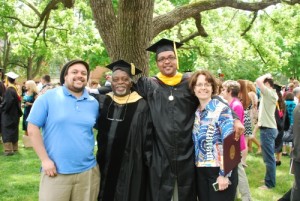
Graduation day for my son; from left to right: my Son Temwanani Tembo, Dr. Tembo, Sekani Tembo and Beth Tembo
One day I causally met this white American girl at our African party. We hit it off and sparks flew as we were very attracted to each other. Our love was living proof to me that love cuts across human taboos and barriers. Years later in November 1980 amidst a night curfew because of an attempted coup, we were married in Lusaka at the St. Ignatius Catholic Church in Rhodes Park in a small private ceremony before about 15 of our closest friends and my uncle Mr. Mayovu. We were young and I was poor and broke. That’s how we started our lives together.
We are blessed with two large united
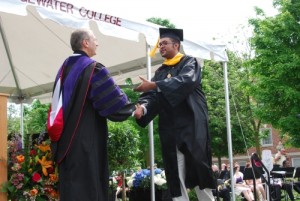
My son Sekani Tembo graduating from Bridgewater College with a Bachelor’s Degree in Computer Science and Philosophy in May 2012.
families in Zambia and the United States. The family rendezvous in Lusaka is my uncle and aunt at Mr. J. J. Mayovu’s house in Lusaka in Chainda farms. I would arrive with my children there on our way to our remote home village in Lundazi. My wife and I are proud that our 3 children know their roots here in Zambia all the way to the village. They all have Zambian names.
Intellectual and Academic Life
I completed my Doctoral Studies at Michigan State University in 1987 with the late Prof. Ruth Hamilton as my Doctoral Committee Chair. I returned to Zambia with intentions of my working at University of Zambia the rest of my life. After 30 years of an exciting, challenging, research, teaching and intellectual life, Bridgewater College awarded me a full Professorship in February 2010.
If I were to perform a bird’s eye view of my life achievements spanning over five decades since the early 1960s, the first thing is that I am everyday so profoundly grateful to the Zambians who fought for me to enjoy the tremendous freedom and especially the free education I had all my life. I thank President Kaunda, Simon Kapwepwe, Harry Nkumbula, Titus Mukupo, Julia Chikamoneka, Nalumino Mundia, Munukayumbwa Sipalo, Reuben Kamanga, Dingiswayo Banda, Justin Chimba, Mainza Chona, Peter Matoka, Elijah Mudenda, Simon Kalulu, Nalumino Mundia, John Mwanakatwe , Munukayumbwa Sipalo, James Skinner, Arthur Wina, Sikota Wina , Grey Zulu; Lewis Changufu and Aaron Milner. Without the efforts, sacrifices, and determination of these and many other thousands of Zambians, I may have experienced slavery, the harsh colonialism of forced labor and being lashed with a shambok. We Zambians and Africans have had over hundred long years of being enslaved through the European Atlantic Slave Trade and the Arab East African slave trade. Then there was European colonialism. There is a picture that has haunted me since I first saw it in my history textbook class in Grade 6 when I was 11 years old one bright morning at Tamanda Primary School in 1965. It is a group of Zambians in a single file chained together some with wooden collars around their necks. They were captured as slaves and being brutally marched through the Savannah bush to an East African Sea port by their Arab captors. My thinking at that time was that the enslaved suffering people could have been me, my father, my brothers, my sisters, my grandparents in the village. This appalled me and wondered why any human being would do such evil things to other human beings.
In my whole life, I have never been interested in routine administration leadership. My passion has been conducting research, dealing with, analyzing, and contemplating philosophical thought. I know I am happy other people purposefully seek, welcome and perform these challenging administrative tasks otherwise I would have no work because someone has to lead and perform administrative jobs. Otherwise I might have no well-run organization or Bridgewater College to work at. Because of this lack of interest, my resume does not have too many having been “Head, Dean, Director, or Chairman” of this or the other organization, Department, Company, College or University.
The organization I am most proud of is being President of Zambia Knowledge Bank (ZANOBA). I had been looking for something very original and important to promote knowledge among our Zambian people. Dr. Wyndioto Chisela, a Physicist, and I met in Canada in 1995 when my family visited his family. We came up with the idea of creating an organization to encourage Zambians to document our history, culture and technology. This organization eventually built a Library at Nkhanga Village in Lundazi which opened to the public December 8, 2012. http://www.bridgewater.edu/zanoba/menu/updates/2012LibraryOpened.shtml
I conducted research field work while at the Institute of African Studies from 1977 up to 1989. Some of that work resulted into the publication of truly original Zambian and African knowledge in my four books: Satisfying Zambian Hunger for Culture (2012) with the Foreword by President Kaunda for which I am very grateful. Titbit for the Curious (1989), Legends of Africa (1996), The Bridge (2005, 2012), and Zambian Traditional Names (2006). I had always wanted to be a journalist. I have published over a hundred newspaper columns, dozens of journal and magazine articles about our Zambian culture.
I taught sociology and psychology at Copperbelt University in 1980. I also taught sociology at Michigan State University while I was a Doctoral student from 1985 to 1987. I taught sociology at University of Zambia in the Social Development Studies department from 1987 to 1989. I have
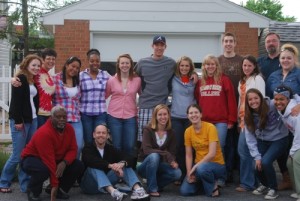
Dr. Tembo with Faculty and his Sociology students at Bridgewater College in Virginia in the United States in May 2011
been teaching at Bridgewater College in Virginia in the United States for the last 23 years. I have taught General Anthropology, Social Problems, Racial and Ethnic Studies, Cultures of Africa, Development and Underdevelopment of the Modern World, Principles of Sociology, Personal Development Portfolio, Sociology of the Caribbean: A Case Study of Jamaica, Quantitative Research Methods using the SPSS and Mystat Computer Program and (National Opinion Research Center) NORC data, American Culture Seminar, Sociology of the Family, and Criminology. I have also done some quiet extensive scientific reading on the science of HIV-AIDS, disease, and the immune system since the disease’s inception in the early 1980s.
Although I have had all this large volume of knowledge about societies, Zambians and Africans over many years , my world view was changed dramatically in May this year when I first read Dr. Chisanga’s Siame research article: “Katunkumene and Ancient Egypt in Africa” from the Journal of Black Studies of 20 March, 2013. My world view changed permanently and forever. The challenge is: “Can we change this world for the majority of 13 million Zambians and then 1 billion Africans?” I did not come to this realization just because I read a short journal article, ate nshima and drank a cup of tea and then said: “Let me think how I can upset so many educated and ordinary Zambians?”
Because of all the knowledge, appreciating history, personal experiences from the village in Zambia to the United States, research, reading so much information and teaching some of it for the last 30 years, I have concluded that we Zambians, from the Ministry of Education Grade One to grade 12 to University of Zambia, we are teaching the wrong or distorted history to ourselves about ourselves. Our history as Zambians started a long time ago from two hundred thousand years ago when we were the first humans in East Africa and Ethiopia. We spread all over the world. The evidence of us having been all over the world is all over the world right now. We just need to have the courage and conviction to find it and interpret it to the world. Europeans used to and have successfully blocked this knowledge but the internet will open the flood gate.
After early humans lived and migrated in small bands and communities for thousands of years, We Zambians and Africans created the Egyptian civilization. The arguments as to whether Egypt had white or black people may be irrelevant and it is a deliberate distraction, mifulungenye (Bemba), msokonezo(Nyanja) kutangwaniska and kujalizgha (Tumbuka), or obfuscation that Europeans cherish which they introduced to justify the beginning of the Atlantic Slave Trade and later European colonialism in Africa. They love to inject race into everything with whites always being superior somehow. African Egyptians in the north were olive skinned and those further south towards the equator were darker skinned.
The Egyptian civilization occurred for 2,010 or more than two thousand years from 3100 B.C.E to 1090 B.C.E. This was about 760 years before the ancient Greeks. The great Ancient Egyptian Civilization which African established was 2,460 years before the very young European Industrial Revolution of the 1700s and 1800s. The 1090 B.C.E to 2013 is 3, 013 years ago. Dr. Siame’s article opened my eyes to the fact that using linguistic analysis known as philology, and then the morphology, phonology, semantics and syntax of language you can trace “Siame” Namwanga Zambian name to the Pharaohs of ancient Egypt three thousand years ago. http://ukzambians.co.uk/home/2013/06/01/zambians-created-ancient-egypt/
The big question is why should our history books still contain only the Eurocentric history that says that our Zambian history is only significant from the 1600s when Europeans started the Atlantic Slave Trade and 1800s when European Colonialism started in Africa? At first for example, the Eurocentric history of my own Tumbuka people said we were just there in Lundazi influenced by the Ngoni and Europeans. But Dr. Yizenge Chondoka’s intensive research and history shows that the Tumbuka came from Central Congo in the 1400s. This is from his book: History of the Tumbuka from 1400 to 1900 (2007). https://hungerforculture.com/?p=259
As a Zambian you may have your own different convoluted half-truth version you read or were taught somewhere about how Africans are different people who have thousands of different tribes and languages. The real objective in using “Sub-Saharan Africa” is European attempt to Europeanize, whiten, and distance Africans from Egypt, Southern Europe and the Middle East. But one thing is clear: there is ample evidence now coming out that we should change and revise this history that wrongly portrays all Zambians, Africans, black people everywhere in the world as inferior, came from slavery, or were just sitting in the African jungle or bush jumping for tree to tree until Europeans arrived. This is a massive distortion and suppression of our history since the Greeks first encountered advanced civilization of Egypt three thousand years ago.
We have had some scholars in Zambia who have done some definitive work on Zambian history and knowledge. For example, Prof. Robert Serpell for more than 40 years has been using modern psychology to analyze our Zambian culture and technology, The Significance of Schooling (1993). https://hungerforculture.com/?p=547.
Dr. Mutumba Mainga Bull researched; Bulozi Under the Luyana Kings: Political Evolution and State Formation in Pre-Colonial Zambia (1973), Professor Mubanga Kashoki published Sirarpi Ohannessian and Mubanga E Kashoki, Language in Zambia (1978). There are many other works. There are some works by European scholars such as Elizabeth Colson among the Tonga. This is not the fault of these scholars. But some of these works go beyond the narrow confines of the Eurocentric view point but some do not.
This is the time to begin conducting wider research that traces our Zambia history not just of culture and technology in the narrow tribal pejorative sense but looking at our role in Astronomy, Engineering, biology, Mathematics, religion, philosophy, technology, architecture, chemistry, biology, cosmology, and language.
Last Word
- My dream is that every Zambian from Mongu to Kasama, Kafulafuta to Kalingalinga in Lusaka, Kariba, Sinazeze, Chililabombwe, Solwezi, all Primary, Secondary schools, University of Zambia and Vietnam, Japan, China, United States and UK should read, use, and contemplate our comprehensive cultural history as presented in the book: “Satisfying Zambian Hunger for Culture”. https://hungerforculture.com/?page_id=242
Even our Ministry of Foreign Affairs and Embassies abroad could use this book. There is no other book that has such comprehensive descriptions of our Zambian culture. I tried to reach State House last December 2012 to see if I could deliver the book personally to the President at State House when I was in Zambia. But I was unable to make the arrangement.
- One of my most important passions for many years has been to help President Kaunda to
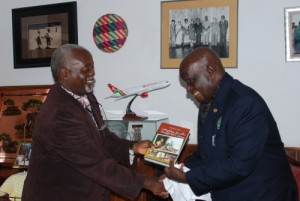
Dr. Tembo handing a copy to President Kaunda a copy of his book: “Satisfying Zambian Hunger for Culture”. The President wrote the foreword to the book.
write his autobiography from 1964 to 1991 during the crucial birth of our nation. This is very important especially that Nelson Mandela is gone. If you read the book “Satisfying Zambian Hunger for Culture” you can see that I can do the best job in writing President’s Kaunda’s autobiography. Writing an easily readable, enjoyable, and engaging autobiography requires tremendous skill. It should never be like writing a technical report. I can do this for nothing although I am relatively poverty stricken. But his autobiography would be President Kaunda’s biggest gift to our country.
- I am proposing that we create a “Center for the Deep Contemplation of Knowledge”. This center should be located in a remote Savannah serene but beautiful location away from the bustle of the city. This is where Zambians can spend quiet time to retreat and contemplate any knowledge they have. This will not be a University, technical R and D, a place to hold workshops, or a place to use alcohol and hold parties. We already have those. This is where serious Zambian men and women, who would be at least 35 years old, can seriously deeply reflect in a serene location all kinds of knowledge: History, Law, Literature, Performing and creative Arts, Philosophy, Religion, Linguistics including and especially Zambian languages, Culture, Economics, Gender and Sexuality, Psychology, Sociology, Political and philosophical science, Computer science, Mathematics, Statistics, Agriculture, Architecture, Divinity, Engineering, Physics, Astronomy and Space, Cosmology, Chemistry, Biology, Medicine. Some of the disciplines such Anthropology have been so contaminated, we should never hesitate to create new disciplines where necessary. Merely repeating or extending epistemological theories that were developed 200 years ago may no longer be useful or give us good explanations or answers as the world continues to change and evolve.
References if Readers want to pursue some of the ideas and knowledge.
Anta Diop, Cheikh., edited and translated by Mercer Cook., The African Origin of Civilization: Myth or Reality, Chicago: Lawrence Hill Books, 1974.
Bernal, Martin., Black Anthena: The Afroasiatic Roots of Classical Civilization, Vol. III, Linguistic Evidence, New Brunswick, Rutgers University Press, 2006.
Bernal, Martin., Black Anthena: The Afroasiatic Roots of Classical Civilization, Vol. I, The Fabrication of Ancient Greece 1785-1985, New Brunswick: Rutgers University Press, 1987.
Lefkowitz, Mary., Not Out of Africa: How Afrocentrism became an excuse for teaching myth as history, Basic Books, 1996, 19997.
Rodney, Walter., How Europe Underdeveloped Africa, Washington, D. C.: Howard University Press, 1974.
Bynum, Bruce., (Ed.) Why Darkness Matters: The Power of Melanin in the Brain, Chicago, Illinois: African American Images, 2005.
King, Richard D., Melanin: A Key to Freedom, 3rd Edition 7th Printing Sept. 2011 Baltimore: Afrikan World Books, Inc., 2010.
King, Richard, M. D., African Origin of Biological Psychiatry, Baltimore, Maryland: African World Books, 199o.
Moore, T. Owens., The Science and the Myth of Melanin: Dispelling the Rumors and Exposing the Fact, Buffalo, NY: Eworld Inc., 1995, 2002.
http://en.wikipedia.org/wiki/Africa
http://en.wikipedia.org/wiki/Lucy_(Australopithecus)
http://worldpopulationreview.com/population-of-jamaica/
https://en.wikipedia.org/wiki/Recent_African_origin_of_modern_humans
https://en.wikipedia.org/wiki/File:Map-of-human-migrations.jpg
http://www.ezilon.com/maps/oceania/papua-new-guinea-physical-maps.html
http://www.ancestry.com/name-origin?surname=banda
http://www.virginia.edu/woodson/courses/aas102%20(spring%2001)/articles/tierney.html
http://www.asante.net/articles/19/race-in-antiquity-truly-out-of-africa/
https://en.wikipedia.org/wiki/Atlantic_slave_trade
http://en.wikipedia.org/wiki/Dark_Ages
December 17, 2013
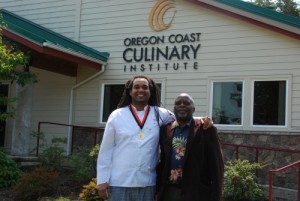
My son Kamwendo Tembo when he graduated from Culinary School at Oregon Coast Culinary Institute in the United States.
